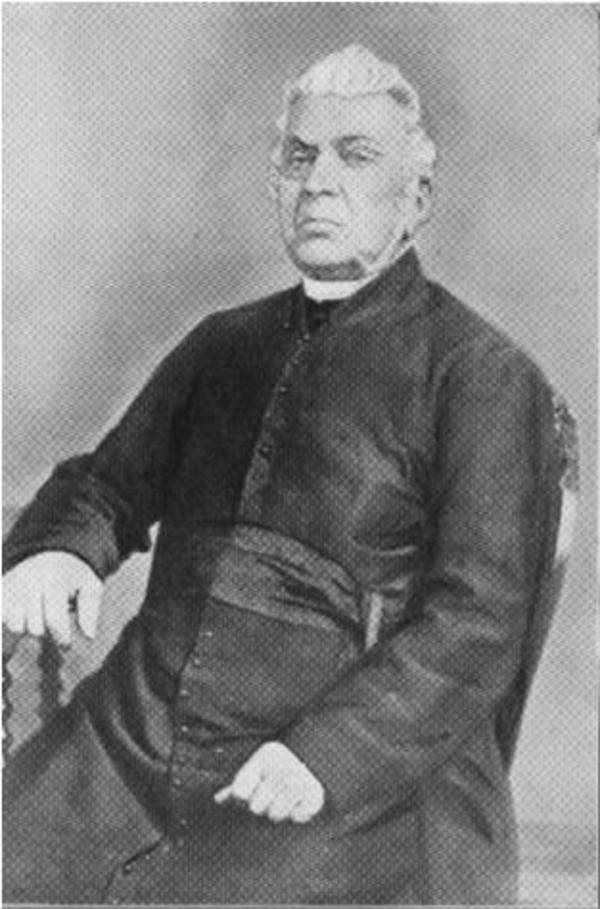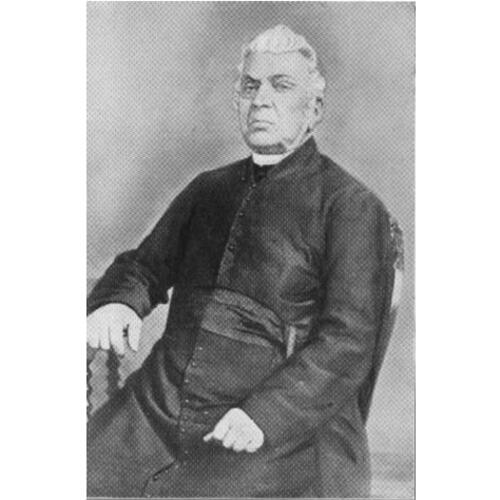
Source: Courtesy of Wikimedia Commons
MANSEAU, ANTOINE, priest, missionary, and vicar general; b. 12 July 1787 at Baie-du-Febvre (Baieville, Que.), son of a farmer, Antoine Manseau, and Marie Côté; d. 7 April 1866 at Montreal.
Antoine Manseau learned to read by the age of six, but in 1796 the death of his parish priest, Pierre-Victor Archambault, from whom he was taking lessons, interrupted his studies. In 1804 he left the family farm to serve as a clerk in the office of notary Étienne Ranvoyzé at Trois-Rivières, where he also learned English. He cancelled the contract that bound him to his master, in 1806, in order to undertake classical studies at Nicolet; these he completed at age 23. He entered the Grand Séminaire de Québec in October 1811, and immediately succeeded Abbé Pierre-Flavien Turgeon as secretary to Bishop Joseph-Octave Plessis*. A few months after his ordination in January 1814, he was sent to the Maritimes with “extraordinary powers” and ministered to the Chéticamp and Tracadie missions. This assignment to a vast territory enabled him to demonstrate that he was both a good walker and an excellent informant for the religious authorities there. When an apostolic vicariate was created for Nova Scotia in 1817, Manseau was recalled by Bishop Plessis and appointed parish priest of Les Cèdres, southwest of Montreal. Named in 1823 vicar general to the bishop of Quebec, Manseau was given responsibility for the missions of Upper Canada for two years during the absence of Alexander Macdonell*, the auxiliary bishop of that district. However, he had no faith in the effectiveness of these long trips, which took him away from his parish to a region he disliked. His transfer from Les Cèdres to Contrecoeur in 1827 coincided with a reply in the newspapers, signed by seven parish priests including Manseau, to the accusations of John Simpson*, mha for York County. Simpson claimed, among other things, that Catholic priests were exercising their influence in temporal affairs unconnected with religion.
In 1835, after a seemingly quiet period, Manseau was invited to become the auxiliary of the future bishop of Montreal, Jean-Jacques Lartigue*. He refused this offer, apparently because of the divergence of his views from those of Lartigue. Nevertheless, he was appointed vicar general to Lartigue in 1837, and three years later accepted the invitation of Bishop Ignace Bourget* to live in the bishop’s palace and administer the diocese during the bishop’s voyage to Europe. Interesting himself in the Mélanges religieux, he tried in vain to obtain the participation in it of the diocese of Quebec. He was prompted by two principal ideas: in order to ensure greater pastoral effectiveness, and in some measure for the sake of nationalism, the clergy should not meddle in politics, but should display unity of spirit and action. Life at the palace soon bothered him so much that he was obliged to take a long rest (1842–43).
On 23 Oct. 1843 Antoine Manseau was appointed parish priest of the village of L’Industrie (Joliette), and experienced a rejuvenation. On account of the poverty of the people, of whom “two thirds are day labourers,” Barthélemy Joliette*, seigneur of Lavaltrie and owner of the church, presbytery, and cemetery, was almost the only one who provided for the needs of the clergy. Anxious about his autonomy and that of the church, Manseau strove to persuade the seigneur to give his wealth to the church during his lifetime rather than through his will. He alone stood up to the seigneur, whose generosities were above all investments that served his interests. In spite of tensions, and within the limits of their respective concerns, they managed to collaborate in various difficult projects: the incorporation of the parish of Saint-Charles-Borromée, which was contested by the neighbouring parishes, and the opening in 1846 of the Collège de Joliette near that of L’Assomption. By the time Joliette died in 1850, Manseau acknowledged his business competence to the point that in 1851 he ceded a plot of ground belonging to the parish council for the building of a market, which would raise the value of the church’s lands. However, he could not take the place of the seigneur, and he recognized that only the introduction of manufacturing could check emigration to the United States.
It was in the interests of the church, although somewhat uneasily too, that Manseau gave his attention to the development of the Collège de Joliette and the coming of the Clerics of St Viator [see Étienne Champagneur*]. Even before the arrival of Champagneur in 1847, he showed the bishops of Quebec and Montreal his distrust with regard to the coming of these Frenchmen and the introduction of independent bodies into the church. He hoped then that the Canadian branch of the congregation would separate from the mother house in France. He suggested in addition that the ownership of the college should not be given directly to this community, in order to allow future control by the bishop. Furthermore, he endeavoured to send recruits to the college and placed complete confidence in Canadians. In short, he was a not inconsiderable factor in the Canadianization of the congregation. But he was soon to divert his attention from this religious body to building a convent (1853) and establishing the Sisters of Providence in his parish (1855). In 1864 he retired to Montreal, where he died two years later.
The image left by Manseau is of an engaging but somewhat inscrutable man. Although preoccupied with the future of the diocese of Montreal, he always remained in contact with the authorities of the diocese of Quebec. Perhaps he was a man of action not content with the role of administrator, or a silent representative of the opposition to the bishop of Montreal.
AAQ, 1 CB, V, 146–50, 155, 159, 163, 165; 303 CD, II, 18; 312 CN, II, 138–49; 320 CN, III, 109–38; 26 CP, II, 17; VI, 27; H, 228f., 280. ACAM, RLB, 1–3; RLL, 2, 5–7, 9; 420.080; 465.105. Archives de la Société historique de Joliette (Joliette, Qué.), Cartable Antoine Manseau, curé. Archives de l’évêché de Joliette (Joliette, Qué.), Cartable Saint-Charles-Borromée-de-L’Industrie, I. Archives des Clercs de Saint-Viateur (Outremont, Qué), Dossier: Amérique (6v. polycopiés, Côteau-du-Lac, Qué., 1955–59), II–VI. Archives paroissiales, Saint-Antoine-de-la-Baie-du-Febvre (Baieville, Qué.), Registres des baptêmes, mariages et sépultures, 12 juill. 1787. Bulletin paroissial (Joliette, Qué.), oct.–nov. 1943. La Gazette de Joliette (Joliette, Qué.), 13, 20 avril 1866. Montreal Gazette, 20, 23, 24 Aug. 1827. Allaire, Dictionnaire. Ivanhoë Caron, “Inventaire de la correspondance de Mgr Bernard-Claude Panet, archevêque de Québec,” ANQ Rapport, 1933–34, 235–421; 1934–35, 321–420; 1935–36, 157–272; “Inventaire de la correspondance de Mgr Joseph-Octave Plessis, archevêque de Québec,” ANQ Rapport, 1927–28, 215–316; 1928–29, 89–208; 1932–33, 3–244; “Inventaire de la correspondance de Mgr Joseph Signay, archevêque de Québec,” ANQ Rapport, 1936–37, 125–330; 1937–38, 23–146. É.-J.[-A.] Auclair, Histoire de la paroisse de Saint-Joseph-de-Soulanges ou les Cèdres (1702–1927) (Montréal, 1927), 113–36. J.-E. Bellemare, Histoire de la Baie-Saint-Antoine, dite Baie-du-Febvre, 1683–1911 (Montréal, 1911), 457–61. Antoine Bernard, Les Clercs de Saint-Viateur au Canada (2v., Montréal, 1947–51), I, 42–253. [Joseph Bonin], Biographies de l’honorable Bartelemi Joliette et de M. le grand vicaire A. Manseau (Montréal, 1874), 174–216. Carrière, Hist. des O.M.I., I, 77–78. Benoît Lévesque, “Naissance et implantation des Clercs de Saint-Viateur au Canada, 1847–1870” (thèse de ma, université de Sherbrooke, Sherbrooke, Qué., 1971), 165–287. J.-C. Robert, “L’activité économique de Barthélemy Joliette et la fondation du village d’Industrie (Joliette), 1822–1850” (thèse de ma, université de Montréal, 1971), 127–64. Wilfrid Caillé, “Messire Antoine Manseau et la paroisse Saint-Charles-Borromée de Joliette,” SCHÉC Rapport, XVII (1949–50), 69–80. J.-C. Robert, “Un seigneur entrepreneur, Barthélemy Joliette, et la fondation du village d’Industrie (Joliette), 1822–1850,” RHAF, XXVI (1972–73), 375–95.
Cite This Article
Benoît Lévesque, “MANSEAU, ANTOINE,” in Dictionary of Canadian Biography, vol. 9, University of Toronto/Université Laval, 2003–, accessed December 14, 2025, https://www.biographi.ca/en/bio/manseau_antoine_9E.html.
The citation above shows the format for footnotes and endnotes according to the Chicago manual of style (16th edition). Information to be used in other citation formats:
| Permalink: | https://www.biographi.ca/en/bio/manseau_antoine_9E.html |
| Author of Article: | Benoît Lévesque |
| Title of Article: | MANSEAU, ANTOINE |
| Publication Name: | Dictionary of Canadian Biography, vol. 9 |
| Publisher: | University of Toronto/Université Laval |
| Year of publication: | 1976 |
| Year of revision: | 1976 |
| Access Date: | December 14, 2025 |



